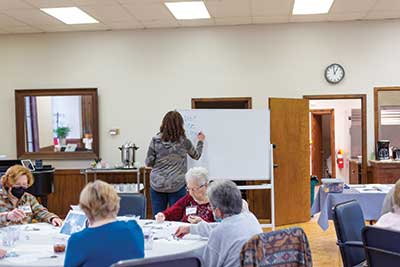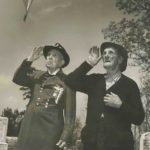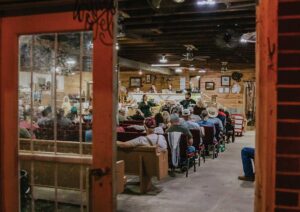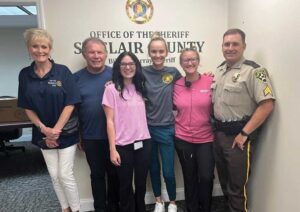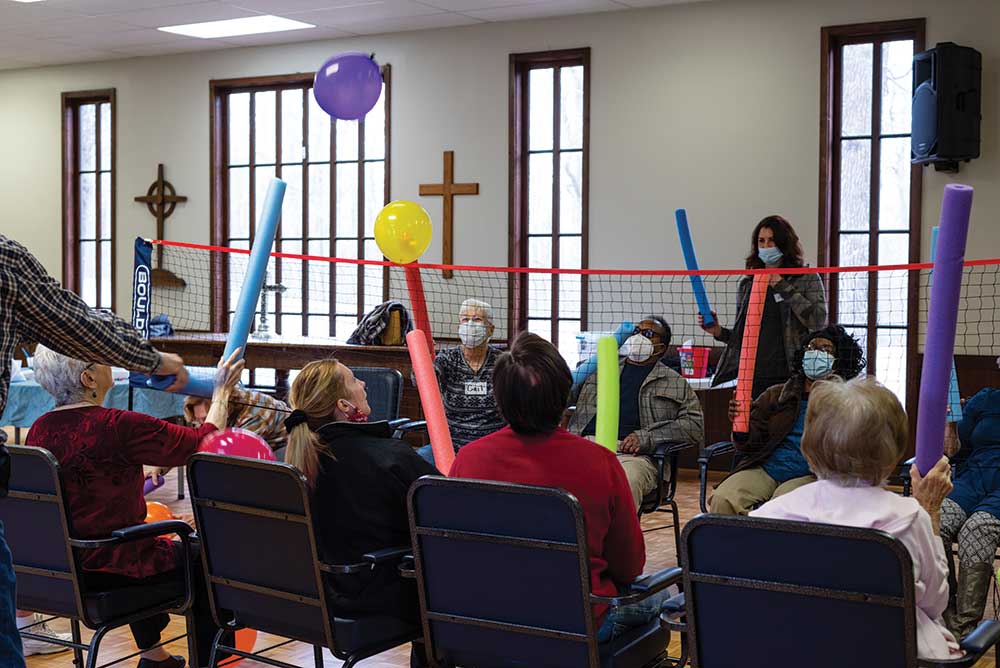
Enriching and encouraging friends and family
Story by Roxann Edsall
Photos by Kelsey Bain
“Look at that baby! What a beautiful baby!” the lady says as she watches the petite blonde across the table from her. “She’s so pretty! What a sweet baby!” Smiling, the small woman responds by lovingly wrapping her baby doll in the pink flowered blanket and gently laying her down on the table.
Whenever she comes to Friendship Place, Brenda’s “baby” will be waiting for her. Brenda’s family brings her to St. Simon Peter’s Friendship Place twice a week for stimulation, affirmation, encouragement and love. Brenda and her family are dealing with the effects of her dementia.
Friendship Place is a respite care facility in Pell City that offers services Tuesdays and Thursdays from 10 a.m. until 2 p.m., allowing full-time caregivers of dementia patients a chance to leave their loved one in a safe and loving environment for a few hours.
The break is important to give caregivers a chance to do things alone that would be hard to accomplish with their family member along. “We’ve found this mission to be three-fold,” says Program Director Melinda Knepper. “It is an important respite time for family or caregivers to do errands or have personal time. It’s also a ministry to the dementia patient. It adds purpose and meaning to their lives. The third element is for the volunteer. They start helping so they can be a blessing to others, but more often than not, they end up leaving each day feeling blessed and fulfilled.”
Today’s theme is “Observe the Weather,” so the group is adjusting each activity to include cognitive enrichment associated with weather. The art activity includes painting an umbrella; the word bank for the word search is all weather-related, as is the bingo game board.
Each day is carefully structured to include both physical and cognitive stimulation. Today’s physical activity is balloon volleyball, played in chairs using pool noodles to hit the balloons over the net. Smiles and excited chatter fill the room as more balloons are added to the game.
Two years ago, the mission was conceived through a discovery process at St. Simon Peter Episcopal Church. The rector at the time began a process to figure out the most pressing community needs. As they neared the end of that process, the need to help families dealing with dementia topped their list.
Christian Love Pantry and Lakeside Hospice, two other thriving community missions also born at St. Simon Peter, quickly outgrew the church and began operating as nonprofits outside of the church walls. It was, in fact, a volunteer with Lakeside Hospice that helped to validate the need for the services Friendship Place offers.
“Elizabeth Thomaston – she goes by Bit – was involved in support groups for families dealing with Alzheimer’s in both Pell City and Leeds,” Knepper explains. “She helped us see the need and get on the right track.” With a grant in hand, they opened just two months before the pandemic hit.
“We had a ton of interest as soon as we opened,” says Knepper, “but then we had to shut down for COVID just a couple of months later. We kept up via Zoom meetings, but we were glad to be able to open back up for in-person care.” Currently, they serve four families a month, but hope the numbers will grow as people get more comfortable being together and COVID anxiety eases.
“We had one family that contacted the patient’s doctor to see if they were OK to come,” adds Knepper, “and she told me the doctor said the benefits of her being here outweigh any of the risks associated with COVID.”
Doctors define dementia as a syndrome that leads to the deterioration of cognitive function to the extent that it interferes with daily living tasks and abilities. It is the result of a variety of diseases and injuries, including stroke and Alzheimer’s.
Statistics from the World Health Organization show that 55 million people worldwide suffer from some form of dementia, with 10 million new cases each year. Alzheimer’s disease is the most common form of dementia, contributing to over 60% of cases. And since 66% of dementia patient care comes from live-in caregivers, the stress on those caregivers is often overwhelming.
Build it, and they will come
Joanna Pickett brings her mother, Dot, to Friendship Place every day it is open. “We were actually here learning about it before they opened. We’d been going to a place quite far from here but came to talk to Melinda when we heard they were thinking of opening a place here,” she says. “It’s hard to imagine how important it is. It gives me a chance to breathe. I enjoy being her full-time caregiver, but with a dementia patient 24/7, there are some things that are very difficult to do when I have her with me.”
With that, she tells of a trip to Hobby Lobby that ended in frustration after her mom, a former artist, insisted on filling the buggy with new brushes and art supplies. “She doesn’t need them anymore, but she believes she does, so it’s a struggle in the store.”
Pickett says that being able to bring her mom to Friendship Place gives her a sense of peace, knowing that the volunteers there genuinely love Dot. On days that she goes, Pickett says, she comes back “a different person. You wouldn’t think a person with dementia would need to be encouraged, but they do. When I pick her up, she’s happy. It stirs up her abilities, and she seems more attentive and calm.”
Even though she doesn’t understand what Friendship Place is when she’s told she’s going that day, Pickett says when she describes it as the place “where you sit at the round tables and play games with your friends,” Dot gets ready with purpose and excitement.
That’s exactly the reaction Knepper wants from the program. “We offer theme-based activities, lunch, games and laughs … lots of laughs. We help them express their independence and give them lots of love from our volunteers.”
Volunteers are key
Volunteers are trained in what memory loss means, the different types of dementia, and how to appropriately interact with those with memory loss. Knepper pairs each patient, whom they refer to as “friends,” with a volunteer for the day. Volunteers guide and encourage the friend and participate along with them throughout the day.
Those volunteers are not just from the church. They are looking for more, so anyone who is interested in serving is encouraged to contact Knepper at St. Simon Peter Episcopal Church.
A volunteer in the program from the first day, Mike Dikeman smiles as he describes his love for the mission. He’d recently retired from Time, Inc., and was looking for a place to volunteer his time.
His dad had suffered from Alzheimer’s dementia for more than a decade, so he knew the frustration associated with his care.
“He lived in Kansas and each time I went to visit, I could tell a difference in him. He would ask me if I’d gained weight. Then a few minutes later, he’d ask again. A few minutes later, the same.”
He enjoys the opportunity to help other families through the process. Is it tough? “No,” he says, “we just have so much fun! Melinda is amazing and it’s a very positive environment.”
They even tease him because one day he rescued a turtle from the road on the way to the church. When he came in, he jokingly asked if it was turtle day, since he had one in his truck.
Against all odds, it actually was World Turtle Day, and turtles were the theme of their activities. The friends got a chance to see a live turtle that day. “Now they ask me on Elephant Day if I have one in my truck,” he jokes. “It’s just a fun place to be.”











